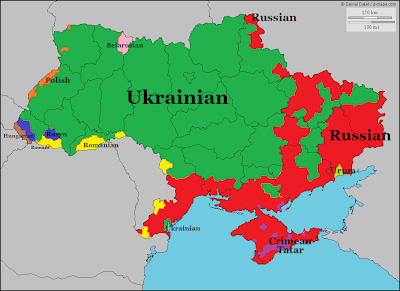 |
| Russia's President Vladimir Putin (R) talks with Ukrainian President Viktor Yanukovych during a signing ceremony at the Kremlin in Moscow. (AFP PHOTO/ALEXANDER NEMENOV) |
One Big Bail Out By Russia
- Two decades after the collapse of communism broke a centuries-old link between Kiev and Moscow, Ukraine's GDP per head is not just well below that of Russia but is only half that of Bulgaria, the poorest country in the European Union.
President Vladimir Putin has taken a gamble with Russia's own fragile economy by bailing out Ukraine for the sake of keeping it in Moscow's orbit and out of the European Union's embrace.
.
His finance minister, Anton Siluanov, defended Tuesday's deal in the Kremlin with Ukrainian President Viktor Yanukovich, which offered Kiev $15 billion in credits and slashed a third off the price it pays for vital Russian gas supplies."I believe that Russia only won," Siluanov told Reuters on Wednesday, dismissing as baseless concerns the accord might damage Moscow's own credibility with investors.
The deal has boosted demand for Ukrainian government debt and its currency, the hryvnia reports Reuters News.
But Russia has had to tap into a rainy-day fund to afford the bailout at a time when its own economy, driven by energy exports, is in trouble. And it is not clear what it gets in return bar influence over the second most populous ex-Soviet state, whose 46-million population is a third that of Russia but whose ailing economy is less than a tenth the size.
More clashes as protests continue against suspension of EU trade talks
 |
| The Ukraine is split by language and culture. |
Ukraine's leaders also face risks. Although Ukraine's prime minister hailed as historic a deal which offers his indebted nation at least temporary economic respite, it could swell numbers at anti-government, pro-EU protests in the capital.
About 3,000 protesters were camped behind high barricades in a central Kiev square after opposition leaders called for mass rallies to bring down Yanukovich for "selling out" Ukraine's national interests and independence to its historic overlord Moscow - and spurning a free trade pact with the EU.
The $15 billion, to be spent on purchasing Ukrainian government debt, may seem like small change for a vast, resource-rich country that sits on half a trillion dollars in foreign exchange reserves and has a strong ability to borrow.
But with Putin himself acknowledging that Russia's more than $2-trillion economy is too dependent on oil and gas and is heading for short-term stagnation, there could soon be economic and political costs: "It is a drop in the ocean," a Russian government source said. "But it could become a painful drop."
The latest official economic forecasts envisage Russia's gross domestic product growing at an average annual rate of 2.5 percent over the next two decades, less than the global average and much slower than some of its emerging-market peers.
Putin regards Ukraine, with its large population, mineral resources and ability to act as a bridge to the EU market, as vital to the success of a Eurasian Union he wants to create to match the economic might of the United States and China.
But two decades after the collapse of communism broke a centuries-old link between Kiev and Moscow, Ukraine's GDP per head is not just well below that of Russia but is only half that of Bulgaria, the poorest country in the European Union.
 |
| Protesters warmed themselves around a fire in Independent Square in Kiev, Ukraine, Saturday, Dec. 7, 2013. Thousands of antigovernment protesters kept their vigil in Ukraine's capital. |


Tidak ada komentar:
Posting Komentar